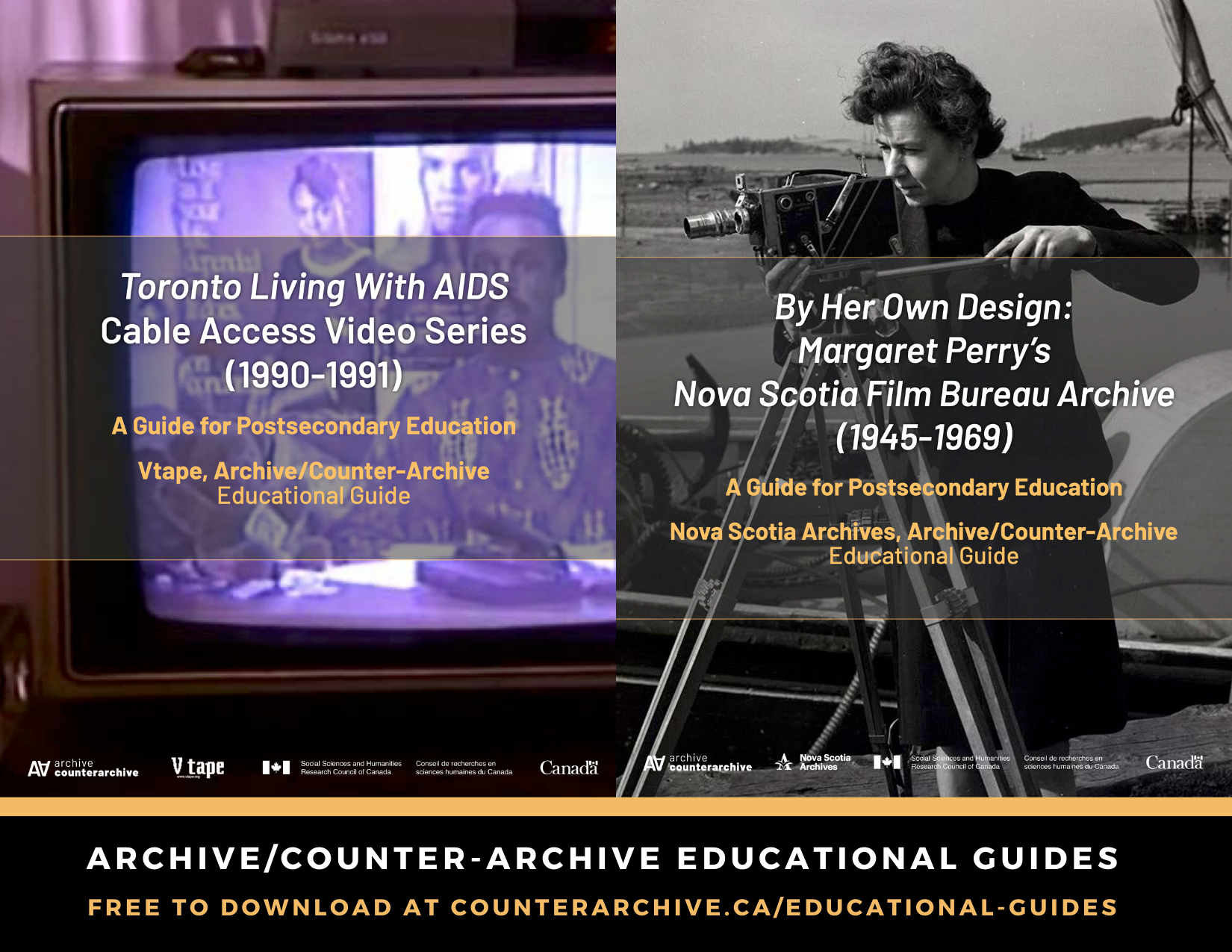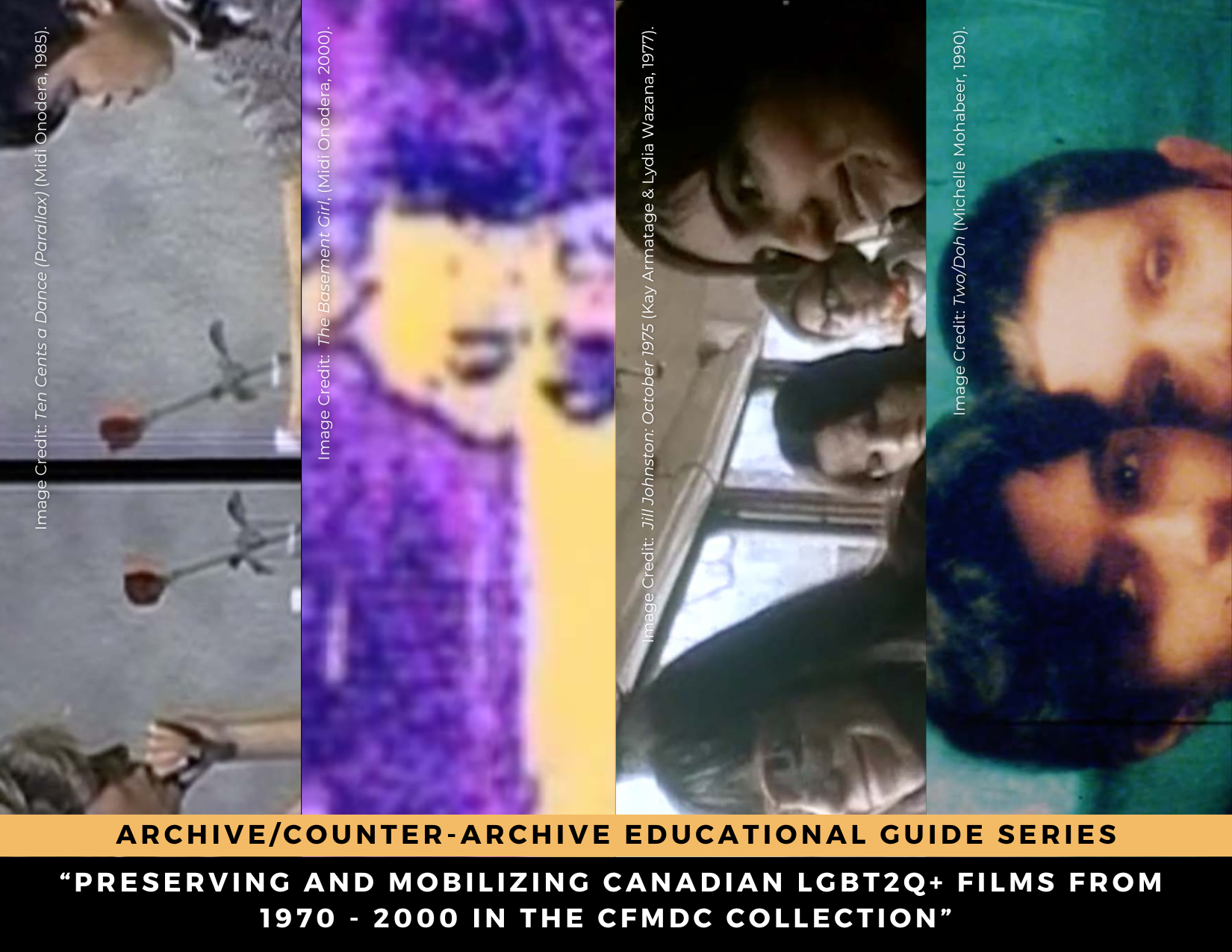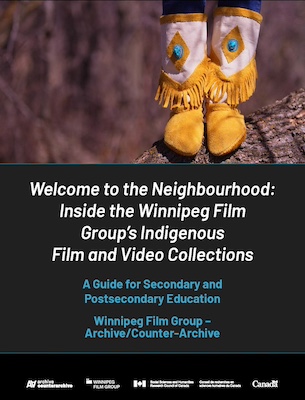Learn more about the pedagogical guides that we are creating on archives and counter-archives.
About Our Educational Guides Series
One of the central goals of Archive/Counter-Archive is to increase public engagement with our partner organizations and their collections through an “activation” of archival materials that foregrounds the pressing need to rethink what archives can/might do in the 21st century. In order to achieve this goal, we have developed a series of Educational Guides designed to accompany film and video from A/CA’s Case Studies and facilitate their integration into K-12 and postsecondary classrooms.
The guides are easily adaptable to different grades and subjects, and educators are encouraged to use these guides as a starting point to create their own lesson plans. Each guide contains important additional context for the materials featured, including information on key participants, essays and reflections, and synopses of selected works for classroom discussion. The guides also include critical discussion questions oriented toward a range of topics to encourage students and teachers to engage critically with A/CA’s archival materials by making connections between their context of creation and contemporary issues and experiences.
VUCAVU Partnership
A/CA has partnered with the Canadian film streaming and distribution platform VUCAVU to host copies of each of our Educational Guides and provide easy access to their corresponding film programs. Each of these programs are available affordable priced. You can view all of the currently available guides and programs by visiting https://vucavu.com/en/a-ca/education-guides.
>> CLICK HERE TO SEE ALL OF OUR GUIDES AND FILM PROGRAMS ON VUCAVU.COM
Margaret Perry / Nova Scotia Archives Guide Series
Margaret Perry is one of Canada’s most important, most prolific, yet least-known woman filmmakers and early film bureaucrats. Perry’s films are complex artifacts that merit careful and critical reflection. During her 24 years at the helm of the Nova Scotia Film Bureau, Perry oversaw the production and direction of over 50 films. Yet, because not much is known about her work as a filmmaker, Perry’s films have been dismissed, often without being seen, on charges of their “anti-modern” depictions of Nova Scotia. And yet, Perry’s films are significant for their creative depictions of a place and time about which limited film records remain and as a cinematic testament to the career of a trail-blazing and visionary filmmaker.
The five downloadable guides that comprise this series reintroduce and critically reframe Margaret Perry and the contribution of her films. They include important contextual information about Perry and her films, a list of films suggested for classroom viewing, film synopses, and discussion questions oriented toward a range of thematic areas. They also suggest supplementary films and resources to complement the gaps present in Perry’s work.
>> CLICK HERE TO ACCESS THE NOVA SCOTIA ARCHIVES GUIDES

Toronto Living with AIDS / Vtape Guide
Toronto Living With AIDS (TLWA) was a 1990-91 public access cable TV program that provided information about HIV/AIDS directly to affected communities. A series of 30-minute videos were created by artists, activists, and community organizations responding to the AIDS crisis. They drew on ideas and strategies from video and performance art, but also employed innovative methods of communication to meet their community-oriented goals. TLWA was coordinated by Michael Balser and John Greyson in collaboration with numerous artists and community organizations, and was screened on cable access television.
This educational guide includes important contextual information for the series as a whole, including information on key participants, a critical reflection on the social, political, and media contexts, a glossary and suggested further reading. It also suggests a list of five films from the series for classroom viewing, offering film synopses and discussion questions focused on this list.
>> CLICK HERE TO ACCESS THE VTAPE EDUCATIONAL GUIDE

Canadian LGBT2Q+ Film / CFMDC Guide Series
This guide series is focused on material generated through the "Beyond the Narrative: Preserving and Mobilizing Canadian LGBT2Q+ Films from 1970 - 2000 in the CFMDC Collection" A/CA Case Study. Many queer works in the collection from this period exist solely on celluloid or in outdated video formats. These formats reflect the influx of affordable technology that became available to queer artists— beginning with more economical film equipment, and then to a greater extent, in the 1980s and 1990s, with video technology. The rapid obsolescence of these formats in the early 2000s, however, has made this era of CFMDC’s LGBT2Q+ collection elusive to scholars, programmers, and the public.
These educational guides and their corresponding film programs raise important questions such as: How do these films open up the ways in which the LGBT2Q+ community historicizes themselves in the era of digital technology and retroviral drugs? What do these films reveal about LGBT2Q+ histories that extend beyond the narrative of HIV/AIDS memorialization or queer confessional films? How were women filmmakers in Canada representing LGBT2Q+ identities on-screen during this period? What do these films reveal about LGBT2Q+ resistance?
>> CLICK HERE TO ACCESS THE CFMDC GUIDES ON VUCAVU.COM

Gendered Violence: Responses and Remediations / VIVO Media Arts Centre Guide Series
The VIVO Media Arts Centre Gendered Violence: Responses and Remediations Case Study activated three archival collections held at VIVO’s Crista Dahl Media Library & Archive that focus on the subject of gendered violence as it was discussed, debated, and exhibited in and around Vancouver in the 1980s. Although united by a common theme, these collections span a variety of topics: the 1989 In Visible Colours film and media festival which aimed to foreground discussions of settler colonialism, decolonization, indigeneity, and solidarity; feminist porn wars and resistance to censorship; and, activist video responses to the Pinochet dictatorship. Taken together, these three collections generate intersectional and multigenerational dialogue about gendered violence; as such, the films and videos in this archive are modes of creative resistance against several forms of subordination and oppression.
In partnership with VIVO Media Arts Centre, the Archive/Counter-Archive project has developed a series of three educational guides that engage with each collection as part of its Gendered Violence: Responses and Remediations Case Study. Each of the guides is accompanied by a corresponding film program.
>> CLICK HERE TO ACCESS THE VIVO MEDIA ARTS CENTRE GUIDES ON VUCAVU.COM

Through Feminist Lenses: Women and Video Works at Groupe Intervention Vidéo
A Montréal-based artist-run centre founded in 1975, Groupe Intervention Vidéo (GIV) is dedicated to the preservation and promotion of media artworks by women (women is used here in the most inclusive sense of the term), distributing and disseminating them while actively supporting production. Over the years, GIV video artists have shed light on important questions and themes: revolution, domesticity, gender, HIV/AIDS, LGBT2Q+, immigration, racism, and many more. The A/CA Case Study thinks about ways in which video artists have approached these subjects, and the politics of inclusion, from 1975 to now, amidst continuous shifts in video technology, production, and social contexts.
As part of their work on this case study, A/CA researchers Alanna Thain and Ylenia Olibet (MIRL at McGill) explored GIV’s distribution catalogue of 1,744 works by 420 women artists and curated a bilingual program of twelve films and accompanying educational guide – Desire Lines: Experimental Video as Social and Spatial Interventions in the GIV Collection. This bilingual guide is designed for postsecondary students (undergraduate and graduate levels), includes a selection of the twelve videos curated by Thain and Olibet, a curatorial essay, synopses, discussion questions oriented toward a range of thematic areas, and suggestions for further reading. The guide is free to download and available in both English and French.
>> CLICK HERE TO ACCESS THE GIV GUIDES ON VUCAVU.COM

Welcome to the Neighbourhood: Inside the Winnipeg Film Group’s Indigenous Film and Video Collections
The Winnipeg Film Group (WFG) is an education, production, exhibition, and distribution centre committed to promoting the art of the moving image. Founded in 1974, the WFG began distributing locally made films in 1981 to help serve Manitoba filmmakers who were creating work, but did not have the knowledge or resources to seek out screenings or sales for their work. The WFG is central to any history of independent and experimental filmmaking in Canada.The WFG Case Study, conducted in partnership with Archive/Counter-Archive, extends the preservation efforts the Film Group itself has undertaken in recent years by identifying and digitizing films sidelined and subordinated in conventional histories of the organization in collaboration. These works have the capability of transforming our understanding of the city, its cinema, and the cultures that converge here. At the heart of the Case Study is the desire to understand how the audio-visual archive serves as both a record of historical inequities and an opportunity to engage in the processes of decolonization. Located at the convergence of the Red and Assiniboine Rivers, a cultural meeting place for 6,000 years, Winnipeg is the ideal site on which to re-examine and reconsider connections between the arts, the archive, and Indigenous-settler relations.
The Welcome to the Neighbourhood: Inside the Winnipeg Film Group’s Indigenous Film and Video Collections educational guide centres on key Indigenous films in the Winnipeg Film Group collection. It is accompanied by a program of ten films curated by Lita Fontaine for classroom viewing. It features a conversation about the curatorial process and Indigenous filmmaking with Lita Fontaine and the Winnipeg Film Group’s (WFG) Andrew Burke, Jillian Groening, and Skye Callow, as well as suggested questions for classroom discussions. The guide is free to download and the corresponding film program can be rented on VUCAVU.
>> CLICK HERE TO ACCESS THE WINNIPEG FILM GROUP GUIDE ON VUCAVU.COM

